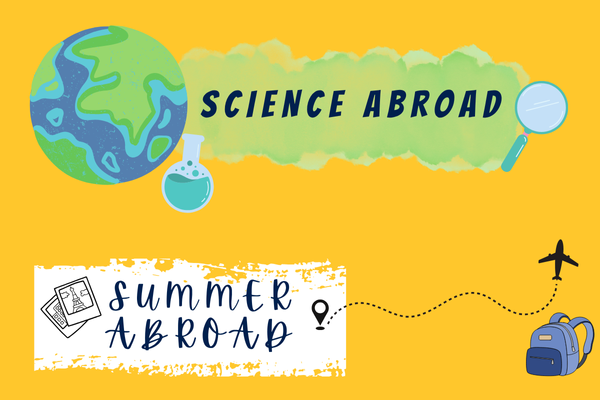
Program Showcase: Science Abroad
Summer Abroad offers different types of international opportunities including Science Abroad, language courses, and other diverse courses, providing an enriching learning experience for undergraduate students.
Science Abroad is a unique summer abroad program that offers science students to complete a research course at one of several prestigious international research institutions. Students will collaborate with peers from other countries and work on a research project under the guidance of lab supervisors at the host institutions. Through this hands-on experience, students will have the opportunity to learn the techniques and data analysis required for the specific research project, and take part in scientific research presentations, while also earning course credit that will count towards their degree requirements. The Science Abroad programs are currently being offered in Switzerland and China for research in physics and human biology.
Our social media correspondent, Jillian, provided details about her experiences on the Science Abroad program in Switzerland.
1) How does the Science Abroad program benefit your academic learning experience?
As a physics student with a deep interest in particle physics, having the opportunity via the Science Abroad program to travel to CERN and work with physicists from across the globe is something I could only have dreamed of. There are so many opportunities here to get a taste for what working in the field of experimental particle physics is really like, in addition to the mentorship and networking possibilities. Also, CERN is home to the largest and most powerful collider on Earth: you can’t get that anywhere else!
2) What has your experience been like so far in the Science Abroad program?
It’s been a lot of fun! The Large Hadron Collider (LHC) is about to enter an upgrade period where we also need to upgrade the ATLAS detector to deal with more powerful collisions, so I’ve had a chance to prototype some of the software that will be used in the final product. More recently, we’ve begun some analysis of data from previous runs to see if we can rediscover the Higgs boson by ourselves. The skills we will develop here will help us to analyze newer data and potentially even discover new physics further in our careers!
3) Do you have any tips on creating a strong application for the Science Abroad program?
Focus on your strengths and make sure you really answer the questions that they’re asking! Sometimes I find that I’m actually answering what I wish the question was rather than what it explicitly says. Knowing what to include and what not to include was also very important for me: for example, while I am greatly interested in quantum gravity, the LHC doesn’t really specialize in that subfield and so I omitted it from my application in favour of beyond the Standard Model (BSM) phenomena instead, which the LHC is actively probing.
4) What are you looking forward to in this program?
One of the things I am most excited for is the summer student lecture series which runs during July. In these lectures, they give us a detailed overview of accelerator and detector physics, nuclear and particle physics, the Standard Model, astroparticle physics and cosmology, and what might lie beyond! It’s a great primer on many topics that we simply don’t have courses for at U of T, so I’m excited to absorb as much information in my last month here as I possibly can.
There are so many benefits to doing each of these programs! We hope this article provides you more insight into the unique program offerings when making an informed decision during the application cycle. Check out the Summer Abroad website for details on the Summer Abroad program offerings.